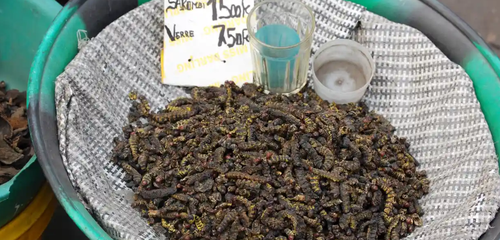
UK projects in the Democratic Republic of the Congo and Zimbabwe are asking rural people to grow more insects
RT – UK-funded relief projects in Zimbabwe and the Democratic Republic of the Congo are encouraging hungry people in these African countries to introduce more nutrient-dense insects into their diet.
As the Guardian reported on Friday, agencies are currently spending $57,000 in the Democratic Republic of the Congo and $346,000 in Zimbabwe on testing the insects’ diets with the aim of introducing them to local residents.
In the Democratic Republic of the Congo, the initiative explores the benefits of eating African caterpillars, migratory locusts, and black soldier flies. Note that there are about 23 species of insects, including termites and cockroaches, that are already consumed in the South Kivu region. However, the population consumes it opportunistically and collects it according to the season.
The Catholic Agency for Overseas Development, a UK-based charity, is now pushing Congolese to start industrially growing insects in a bid to end the region’s famine problems.
In Zimbabwe, another aid agency is looking at ways to use mopane worms in porridge served in schools. The Guardian notes that these sticky green caterpillars, which transform into emperor butterflies, are actually harvested for consumption on vegetation during rainy seasons.
The project aims to develop insect-infested porridge to feed poor children in Gwanda, southern Zimbabwe, and Harare, Zimbabwe. The agency says this dish will combine locally grown mopane worms with grains and fruit, and offer all the essential vitamins and minerals such as phosphorous, potassium, iron, copper, zinc, manganese, and sodium as well as vitamins B1 and B2.
the doctor. The introduction of the insect-based meal is just the first phase of the project, which will also conduct randomized trials to see if the dish has an effect on children’s performance in school and benefits their health, Alberto Fiore, professor of chemistry and food technology who is leading the project in Zimbabwe, told the Guardian.
Both projects in Zimbabwe and the Democratic Republic of the Congo are funded by UK Research and Innovation (UKRI), which is part of the Department for Business, Energy and Industrial Strategy.
A UKRI spokesperson told the Guardian that the organization hoped that funding such projects would “benefit citizens around the world, regardless of their economic situation” and noted the environmental benefits of consuming an insect-based diet.
Knowledge gives you freedom. I want to be a member. Follow us cable.
to you who have come this far, Thank you very much for your appreciation of our content. Unlike corporate media, Brasil 247 and TV 247 Fund themselves through their own community of readers and viewers. You can support TV 247 and the Brasil 247 website in several ways. See how at brasil247.com/apoio
Support 247

“Friendly zombie guru. Avid pop culture scholar. Freelance travel geek. Wannabe troublemaker. Coffee specialist.”






